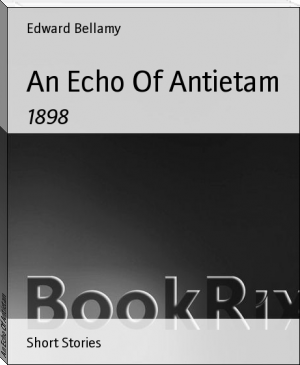An Echo Of Antietam, Edward Bellamy [reading books for 6 year olds .TXT] 📗

- Author: Edward Bellamy
Book online «An Echo Of Antietam, Edward Bellamy [reading books for 6 year olds .TXT] 📗». Author Edward Bellamy
I
The air was tremulous with farewells. The regiment, recruited within sight of the steeples of Waterville, and for three months in camp just outside the city, was to march the next morning. A series of great battles had weakened the Federal armies, and the authorities at Washington had ordered all available men to the front.
The camp was to be broken up at an early hour, after which the regiment would march through the city to the depot to take the cars. The streets along the route of the march were already being decorated with flags and garlands. The city that afternoon was full of soldiers enjoying their last leave of absence. The liquor shops were crowded with parties of them drinking with their friends, while others in threes and fours, with locked arms, paraded the streets singing patriotic songs, sometimes in rather maudlin voices, for to-day in every saloon a soldier might enter, citizens vied for the privilege of treating him to the best in the house. No man in a blue coat was suffered to pay for anything.
For the most part, however, the men were sober enough over their leave-taking. One saw everywhere soldiers and civilians, strolling in pairs, absorbed in earnest talk. They are brothers, maybe, who have come away from the house to be alone with each other, while they talk of family affairs and exchange last charges and promises as to what is to be done if anything happens. Or perhaps they are business partners, and the one who has put the country's business before his own is giving his last counsels as to how the store or the shop shall be managed in his absence. Many of the blue-clad men have women with them, and these are the couples that the people oftenest turn to look at. The girl who has a soldier lover is the envy of her companions to-day as she walks by his side. Her proud eyes challenge all who come, saying, "See, this is my hero. I am the one he loves."
You could easily tell when it was a wife and not a sweetheart whom the soldier had with him. There was no challenge in the eyes of the wife. Young romance shed none of its glamour on the sacrifice she was making for her native land. It was only because they could not bear to sit any longer looking at each other in the house that she and her husband had come out to walk.
In the residence parts of the town family groups were gathered on shady piazzas, a blue-coated figure the centre of each. They were trying to talk cheerfully, making an effort even to laugh a little.
Now and then one of the women stole unobserved from the circle, but her bravely smiling face as she presently returned gave no inkling of the flood of tears that had eased her heart in some place apart. The young soldier himself was looking a little pale and nervous with all his affected good spirits, and it was safe to guess that he was even then thinking how often this scene would come before him afterwards, by the camp-fire and on the eve of battle.
In the village of Upton, some four or five miles out of Waterville, on a broad piazza at the side of a house on the main street, a group of four persons were seated around a tea-table.
The centre of interest of this group, as of so many others that day, was a soldier. He looked not over twenty-five, with dark blue eyes, dark hair cut close to his head, and a mustache trimmed crisply in military fashion. His uniform set off to advantage an athletic figure of youthful slender-ness, and his bronzed complexion told of long days of practice on the drill-ground in the school of the company and the battalion. He wore the shoulder-straps of a second lieutenant.
On one side of the soldier sat the Rev. Mr. Morton, his cousin, and on the other Miss Bertha Morton, a kindly faced, middle-aged lady, who was her brother's housekeeper and the hostess of this occasion.
The fourth member of the party was a girl of nineteen or twenty. She was a very pretty girl, and although to-day her pallid cheeks and red and swollen eyelids would to other eyes have detracted somewhat from her charms, it was certain that they did not make her seem less adorable to the young officer, for he was her lover, and was to march with the regiment in the morning.
Lieutenant Philip King was a lawyer, and by perseverance and native ability had worked up a fair practice for so young a man in and around Upton. When he volunteered, he had to make up his mind to leave this carefully gathered clientage to scatter, or to be filched from him by less patriotic rivals; but it may be well believed that this seemed to him a little thing compared with leaving Grace Roberts, with the chance of never returning to make her his wife. If, indeed, it had been for him to say, he would have placed his happiness beyond hazard by marrying her before the regiment marched; nor would she have been averse, but her mother, an invalid widow, took a sensible rather than a sentimental view of the case. If he were killed, she said, a wife would do him no good; and if he came home again, Grace would be waiting for him, and that ought to satisfy a reasonable man. It had to satisfy an unreasonable one. The Robertses had always lived just beyond the garden from the parsonage, and Grace, who from a little girl had been a great pet of the childless minister and his sister, was almost as much at home there as in her mother's house. When Philip fell in love with her, the Mortons were delighted. They could have wished nothing better for either. From the first Miss Morton had done all she could to make matters smooth for the lovers, and the present little farewell banquet was but the last of many meetings she had prepared for them at the parsonage.
Philip had come out from camp on a three-hours' leave that afternoon, and would have to report again at half-past seven. It was nearly that hour now, though still light, the season being midsummer. There had been an effort on the part of all to keep up a cheerful tone; but as the time of the inevitable separation drew near, the conversation had been more and more left to the minister and his sister, who, with observations sometimes a little forced, continued to fend off silence and the demoralization it would be likely to bring to their young friends. Grace had been the first to drop out of the talking, and Philip's answers, when he was addressed, grew more and more at random, as the meetings of his eyes with his sweetheart's became more frequent and lasted longer.
"He will be the handsomest officer in the regiment, that's one comfort. Won't he, Grace?" said Miss Morton cheerily.
The girl nodded and smiled faintly. Her eyes were brimming, and the twitching of her lips from time to time betrayed how great was the effort with which she kept her self-command.
"Yes," said Mr. Morton; "but though he looks very well now, it is nothing to the imposing appearance he will present when he comes back with a colonel's shoulder-straps. You should be thinking of that, Grace."
"I expect we shall hear from him every day," said Miss Morton. "He will have no excuse for not writing with all those envelopes stamped and addressed, with blank paper in them, which Grace has given him. You should always have three or four in your coat pocket, Phil."
The young man nodded.
"I suppose for the most part we shall learn of you through Grace; but you mustn't forget us entirely, my boy," said Mr. Morton. "We shall want to hear from you directly now and then."
"Yes; I 'll be sure to write," Philip replied.
"I suppose it will be time enough to see the regiment pass if we are in our places by nine o'clock," suggested Miss Morton, after a silence.
"I think so," said her brother. "It is a great affair to break camp, and I don't believe the march will begin till after that time."
"James has got us one of the windows of Ray & Seymour's offices, you know, Philip," resumed Miss Morton; "which one did you say, James?"
"The north one."
"Yes, the north one," she resumed. "They say every window on Main Street along the route of the regiment is rented. Grace will be with us, you know. You must n't forget to look up at us as you go by--as if the young man were likely to!"
He was evidently not now listening to her at all. His eyes were fastened upon the girl's opposite him, and they seemed to have quite forgotten the others. Miss Morton and her brother exchanged compassionate glances. Tears were in the lady's eyes. A clock in the sitting-room began to strike:
"One, two, three, four, five, six, seven."
Philip started.
"What time is that?" he asked, a little huskily. No one replied at once. Then Mr. Morton said:
"I am afraid it struck seven, my boy."
"I must leave in ten minutes then," said the young man, rising from the table. The rest followed his example.
"I wonder if the buggy will be in time?" said he.
"It is at the gate," replied Miss Morton. "I heard it drive up some time ago."
Unmindful of the others now, Philip put his arm about Grace's waist and drew her away to the end of the piazza and thence out into the garden.
"Poor young things," murmured Miss Morton, the tears running down her cheeks as she looked after them. "It is pitiful, James, to see how they suffer."
"Yes," said the minister; "and there are a great many just such scenes to-day. Ah, well, as St. Paul says, we see as yet but in part."
Passing in and out among the shrubbery, and presently disappearing from the sympathetic eyes upon the piazza, the lovers came to a little summer-house, and there they entered. Taking her wrists in his hands, he held her away from him, and his eyes went slowly over her from head to foot, as if he would impress upon his mind an image that absence should not have power to dim.
"You are so beautiful," he said, "that in this moment, when I ought to have all my courage, you make me feel that I am a madman to leave you for the sake of any cause on earth. The future to most men is but a chance of happiness, and when they risk it they only risk a chance. In staking their lives, they only stake a lottery ticket, which would probably draw a blank. But my ticket has drawn a capital prize. I risk not the chance, but the certainty, of happiness. I believe I am a fool, and if I am killed, that will be the first thing they will say to me on the other side."
"Don't talk of that, Phil. Oh, don't talk of being killed!"
"No, no; of course not!" he exclaimed. "Don't fret about that; I shall not be killed. I've no notion of being killed. But what a fool I





Comments (0)